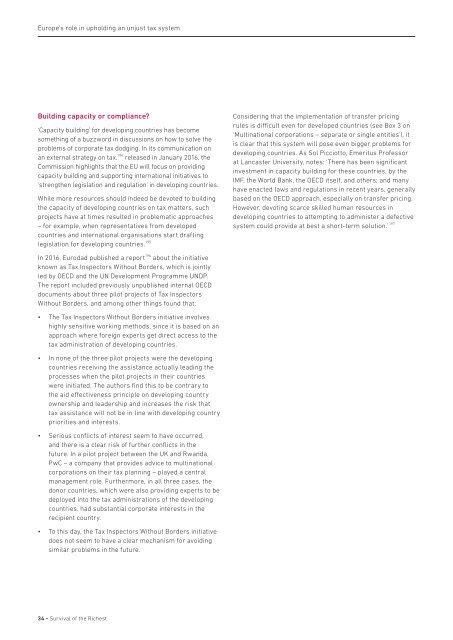You also want an ePaper? Increase the reach of your titles
YUMPU automatically turns print PDFs into web optimized ePapers that Google loves.
Europe's role in upholding an unjust tax system<br />
Building capacity or compliance?<br />
‘Capacity building’ for developing countries has become<br />
something <strong>of</strong> a buzzword in discussions on how to solve <strong>the</strong><br />
problems <strong>of</strong> corporate tax dodging. In its communication on<br />
an external strategy on tax, 194 released in January 2016, <strong>the</strong><br />
Commission highlights that <strong>the</strong> EU will focus on providing<br />
capacity building and supporting international initiatives to<br />
‘streng<strong>the</strong>n legislation and regulation’ in developing countries.<br />
While more resources should indeed be devoted to building<br />
<strong>the</strong> capacity <strong>of</strong> developing countries on tax matters, such<br />
projects have at times resulted in problematic approaches<br />
– for example, when representatives from developed<br />
countries and international organisations start drafting<br />
legislation for developing countries. 195<br />
Considering that <strong>the</strong> implementation <strong>of</strong> transfer pricing<br />
rules is difficult even for developed countries (see Box 3 on<br />
‘Multinational corporations – separate or single entities’), it<br />
is clear that this system will pose even bigger problems for<br />
developing countries. As Sol Picciotto, Emeritus Pr<strong>of</strong>essor<br />
at Lancaster University, notes: ‘There has been significant<br />
investment in capacity building for <strong>the</strong>se countries, by <strong>the</strong><br />
IMF, <strong>the</strong> World Bank, <strong>the</strong> OECD itself, and o<strong>the</strong>rs; and many<br />
have enacted laws and regulations in recent years, generally<br />
based on <strong>the</strong> OECD approach, especially on transfer pricing.<br />
However, devoting scarce skilled human resources in<br />
developing countries to attempting to administer a defective<br />
system could provide at best a short-term solution.’ 197<br />
In 2016, Eurodad published a report 196 about <strong>the</strong> initiative<br />
known as Tax Inspectors Without Borders, which is jointly<br />
led by OECD and <strong>the</strong> UN Development Programme UNDP.<br />
The report included previously unpublished internal OECD<br />
documents about three pilot projects <strong>of</strong> Tax Inspectors<br />
Without Borders, and among o<strong>the</strong>r things found that:<br />
• The Tax Inspectors Without Borders initiative involves<br />
highly sensitive working methods, since it is based on an<br />
approach where foreign experts get direct access to <strong>the</strong><br />
tax administration <strong>of</strong> developing countries.<br />
• In none <strong>of</strong> <strong>the</strong> three pilot projects were <strong>the</strong> developing<br />
countries receiving <strong>the</strong> assistance actually leading <strong>the</strong><br />
processes when <strong>the</strong> pilot projects in <strong>the</strong>ir countries<br />
were initiated. The authors find this to be contrary to<br />
<strong>the</strong> aid effectiveness principle on developing country<br />
ownership and leadership and increases <strong>the</strong> risk that<br />
tax assistance will not be in line with developing country<br />
priorities and interests.<br />
• Serious conflicts <strong>of</strong> interest seem to have occurred,<br />
and <strong>the</strong>re is a clear risk <strong>of</strong> fur<strong>the</strong>r conflicts in <strong>the</strong><br />
future. In a pilot project between <strong>the</strong> UK and Rwanda,<br />
PwC – a company that provides advice to multinational<br />
corporations on <strong>the</strong>ir tax planning – played a central<br />
management role. Fur<strong>the</strong>rmore, in all three cases, <strong>the</strong><br />
donor countries, which were also providing experts to be<br />
deployed into <strong>the</strong> tax administrations <strong>of</strong> <strong>the</strong> developing<br />
countries, had substantial corporate interests in <strong>the</strong><br />
recipient country.<br />
• To this day, <strong>the</strong> Tax Inspectors Without Borders initiative<br />
does not seem to have a clear mechanism for avoiding<br />
similar problems in <strong>the</strong> future.<br />
34 • <strong>Survival</strong> <strong>of</strong> <strong>the</strong> <strong>Richest</strong>


